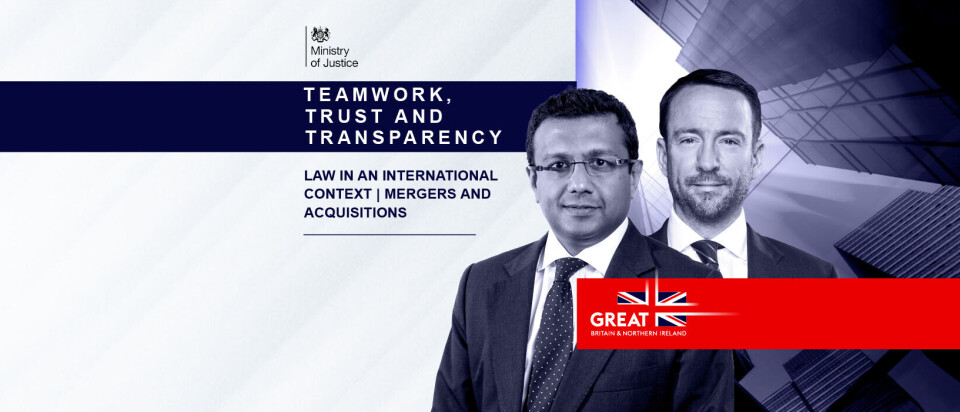Copyright : Re-publication of this article is authorised only in the following circumstances; the writer and Africa Legal are both recognised as the author and the website address www.africa-legal.com and original article link are back linked. Re-publication without both must be preauthorised by contacting editor@africa-legal.com
Teamwork, trust, and transparency

With African-based transactions becoming increasingly numerous and complex, international mergers and acquisitions experts Paras Shah and Chris Baird spoke with Craig Sisterson about the impact for lawyers.
As large transactions involving African businesses have grown significantly, in number and scale, so has the involvement of African lawyers and the collaboration between local and international practitioners, say leading M&A experts Paras Shah and Chris Baird.
“The role that African lawyers play is no longer just the local lawyer doing a small legal opinion or something like that,” explained Shah, managing partner in the Kenyan office of leading pan-African firm Bowmans. “African lawyers are now very much working in the same room as the international lawyers, getting a seat at the negotiating table with the client, and having a bigger slice of the client’s work as far as work in Africa is concerned.”
The relationship between African-based and international lawyers is now “very much one of partnership”, Shah believes. Baird, who heads DLA Piper’s London desk for African M&A and private equity, agrees, noting there’s now “significantly more collaboration” between international and local lawyers, due to the complexity of the M&A work and local conditions.
“The local dynamics are complex in a continent of 54 countries, with huge ethnic and linguistic diversity,” commented Baird. “It’s really hard to get these transactions done without local advice from people who understand the local regulatory and business environments. I think the way things have changed is that there’s now more collaboration, with more involvement and greater specialisation at a local level.”
That specialisation by African lawyers is not only in terms of practice area, but also specific industries and sectors, which follows an international trend, said Baird.
Shah and Baird both point to fintech and infrastructure as key sectors helping drive the boom in international M&A work involving African businesses. Shah noted the global and regional interest in African payment systems, mobile money and digital banking, and the convergence of financial services, pointing to the acquisition of M-Pesa, the largest payment system in Africa, by Kenya’s leading telecom firm Safaricom and South Africa’s Vodacom.
Along with rapid digitisation during the pandemic, fintech growth in Africa has been shaped by population demographics, said Baird. “An emerging middle class, younger populations, and more urbanisation is driving the need for better and more inclusive financial services.”
For Baird, the second biggest sector is infrastructure – both digital and energy infrastructure, which are entwined given fintech’s reliance on digital infrastructure and the latter’s reliance on reliable energy. However, there are also good opportunities for growth, investment and M&A work in almost every sector, from healthcare and agriculture to media and entertainment.
African-based transactions are becoming increasingly complex and nuanced, given the multinational stakeholders, and Shah emphasised that local and international lawyers need to develop strong skills in several areas to best serve their clients.
Along with understanding and appreciating local knowledge about regulators, parties, and how things operate on the ground, Shah said African and international M&A lawyers would be wise to upskill on tax practices, negotiating with African parties – “reading the room in Africa is critical” – and the latest technology that can assist with large transactions.
Teamwork is vital, added Baird.
“All the usual skillsets go into teamwork – clear responsibility, communication, accountability, enthusiasm – but I think fundamentally collaboration, for me, is a mind-set and is about trust,” he continued. “It’s about transparency. Working with local teams on a regular basis, and having a single focus helps to ensure the client gets the very best local and international advice from a core team that it can relate to. While it sounds simple, it can be difficult to do in practice when you’re working across jurisdictions with a range of lawyers. Luckily the more you collaborate, the easier it gets.”
In partnership with the UK Ministry of Justice and GREAT Legal services, we would like to invite you to register to attend our engagement programme, in Johannesburg on 31 August 2022. Join our panel discussion of experts looking at the operation of law at an international level. We'll be focussing specifically on the benefits of dual-qualification into additional foreign markets and how this can enhance and accelerate your career. Clickhere to register.
To join Africa Legal's mailing list please click here
